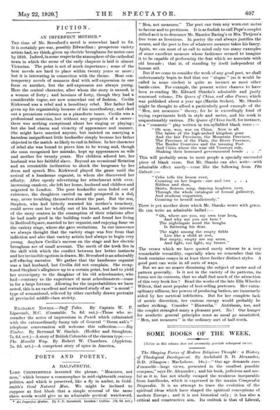FICTION.
AN IMPERFECT MOTHER.*
THE time of Mr. Beresford's novel is somewhat hard to fix. It-is certainly pre-war, possibly Edwardian : prosperous variety artists had, we think, given up electric broughams for motor-cars by 1910. Indeed, in some respects the atmosphere of the cathedral town in which the scene of the early chapters is laid is almost Victorian. The point is not of much importance ; some of the best novels are hard to place within twenty years or more ; but it is interesting in connection with the theme. Most con- temporary novels of manners deal with self-expression in one form or another, but the self-expressers are always young. Here the central character, after whom the story is named, is a woman of forty ; and heroines of forty, though they had a considerable vogue, are now somewhat out of fashion. Cecilia Kirkwood was a rebel and a hereditary rebel. Her father had given up his organistahip because of his unorthodoxy, and eked out a precarious existence as a pianoforte tuner. Cecilia was a professional musician, but without any prospects of a career : there was nothing exceptional about her singing or playing ; but she had charm and vivacity of appearance and manner. She might have married anyone, but insisted on marrying a harmless insignificant little bookseller simply because her father objected to the match as likely to end in failure. In her character of rebel she was bound to prove him to be wrong and, though she soon recognized her mistake, kept up appearances as wife and mother for twenty years. Her children adored her, her husband was her faithful slave. Beyond an occasional flirtation and an irresistible inclination to shock the burgesses by her dress and speech Mrs. Kirkwood played the game until the arrival of a handsome organist, in whom she discovered her affinity. After openly advertizing her attachment with ever- increasing candour, she left her home, husband and children and migrated to London. The poor bookseller soon faded out of existence, the daughters carried on and prospered in a dull way, never troubling themselves about the past. But the son, Stephen, who had bitterly resented his mother's treachery, could never cast her wholly out of his heart, and the interest of the story centres in the resumption of their relations after he had made good in the building trade and found her living in Bedford Square, married to her organist, and enjoying fame on the variety stage, where she gave recitations. In our innocence we always thought that the variety stage was free from that infliction and also that variety artists had always to begin very young. Anyhow Cecilia's success on the stage and her electric
brougham are of small account. The merit of the book lies in the skill with which the conflict between her better instincts and her invincible egotism is drawn. Mr. Beresford is an admirably self-effacing narrator. We gather that the handsome organist was a bad husband, but Cecilia did not complain. She recap- tured Stephen's allegiance up to a certain point, but had to yield her sovereignty to the daughter of his old schoolmaster, who had—contrary to the experience of most schoolmasters—come in for a large fortune. Allowing for the improbabilities we have noted, this is an excellent and restrained study of an " a-moral " type of womanhood, relieved by other carefully drawn portraits of provincial middle-class society.


































 Previous page
Previous page